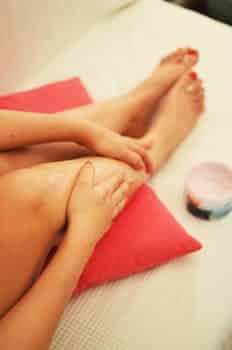
Vulvar Varicosities: Don’t Suffer in Silence!
It seems conceivable that when health experts estimate that 10 percent of pregnant women experience vulvar varicosities, that is to say vaginal varicose veins, they could be grossly underestimating the incidence of this condition.
There are women—who knows how many—who will not report this pain, itch, heaviness and general discomfort in the vulva, either because they chalk it up to the general joy and discomfort of pregnancy, or because they are simply not comfortable talking about it. These women might not know that there are qualified vein specialists who can help with this condition. You might be one of those women.
Vulvar Varicosities Can Persist Past Pregnancy
The problem is that once there, a vulvar varicosity will often not go away. Vulvar varices may become asymptomatic without the added hormones and baby pressing on the blood vessels. But the underlying condition remains, perhaps to return, persist, or worsen with another pregnancy—or for those women who are genetically predisposed to varicose veins.
This can make walking, standing, and sitting, uncomfortable. Sex can become less fun, or even painful.
Vulvar Varicosities Treatment and Relief
If bulging, painful vaginal varicose veins are a problem for you—during pregnancy or after—there are simple things you can do to try to find some relief.
- Consult with your doctor about topical treatments for the itch, pain and feeling of heaviness;
- Consider compression garments. They are strappy in appearance, but the pressure they provide can help relieve some discomfort in the surrounding tissue;
- Change your body position often. Alternate sitting, standing, walking and lying down;
- Some experts suggest that you go for a swim if you are pregnant. The buoyancy of the water can lift baby off of blood vessels in the vulvar and perineal areas;
- Elevate the hips slightly when lying down. Use gravity to take a load off the blood vessels.
If these varicosities persist, and they are affecting your quality of life, seriously consider making an appointment for a free consultation with a qualified vein specialist today. Dr. Jilanne Rose, DNP of Advanced Vein Institute of Arizona specializes in treating vulvar varicosities and superficial varicosities of the lower limb and has performed thousands of procedures in women who are experiencing the same discomfort that you are. She will be able to tailor a treatment plan just for you and determine whether Chronic Venous Insufficiency is a contributing factor in your condition.
The only catch is that you will have to talk about it...just a little bit.
The good news, however, is that a professional like Jilanne Rose, DNP-C will make the process—from consultation to treatment to recovery—as comfortable as possible.
Q & A Pregunta: ¿Qué es el tiempo de induración? Respuesta: el downtime se basa en gran medida en el tipo de intervención y la severidad de la enfermedad venosa. Independientemente del tipo de intervención, nuestros pacientes reanudan todas las actividades el mismo día que el tratamiento. Algunos tratamientos requieren medias de compresión post-procedimiento, pero…
Read MoreQ & A Question: What is the down time? Answer: Downtime is largely based on the type of intervention and severity of the vein disease. Regardless of the type of intervention, our patients resume all activities the same day as treatment. Some treatments require compression stockings post-procedure, but most times these are worn for comfort and…
Read MoreVenas dolorosas y antiestéticas de las piernas Con el calor de Arizona, un día de verano, día de invierno, o cualquier día es ideal para usar shorts. Pero para aquellos con varices o venas de araña, la idea de usar pantalones cortos es preocupante y lleva a la ansiedad severa. Según el Departamento de salud…
Read MorePainful and unsightly leg veins With the Arizona heat, a summer day, winter day, or any day is ideal for wearing shorts. But for those with varicose veins or spider veins, the thought of wearing shorts is troubling and leads to severe anxiety. According to the U.S. Department of Health and Human Services, 55% of…
Read MorePregunta: ¿dos ultrasonidos Doppler encuentran cualquier coágulo de pierna? (Muslo o pantorrilla). ¿Es el síndrome de mayo-Thurner (MTS) posible y un venography necesario en mi caso?
Read MoreQuestion: Would two Doppler ultrasounds find any leg clots? (Thigh or calf). Is May-Thurner syndrome (MTS) possible and a venography necessary in my case?
Read MoreSi quisiera deshacerse de las venas antiestéticas, las venas de araña, o las varices dolorosas; a continuación, la búsqueda de resultados de escleroterapia, a través de un especialista en la vena, puede ser la elección correcta para ayudar a mejorar su dolor, la felicidad y su apariencia. En este procedimiento rutinario, el médico de la…
Read MoreIf would like to get rid of unsightly veins, spider veins, or painful varicose veins; then pursuing sclerotherapy results, through a vein specialist, may be the right choice to help improve your pain, happiness, and your look. In this routine procedure, your vein doctor injects a chemical into the veins which will cause the veins…
Read MoreParece concebible que cuando los expertos en Salud estiman que el 10 por ciento de las mujeres embarazadas experimentan várices vulvares, es decir, varices vaginales, podrían subestimar groseramente la incidencia de esta afección. Hay mujeres — que saben cuántas — que no reportarán este dolor, picazón, pesadez e incomodidad general en la vulva, ya sea…
Read MoreIt seems conceivable that when health experts estimate that 10 percent of pregnant women experience vulvar varicosities, that is to say vaginal varicose veins, they could be grossly underestimating the incidence of this condition. There are women—who knows how many—who will not report this pain, itch, heaviness and general discomfort in the vulva, either because…
Read More

